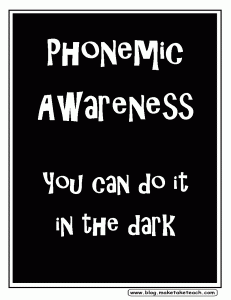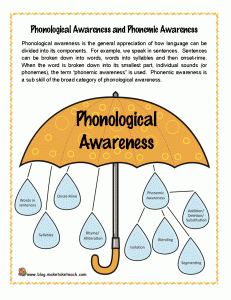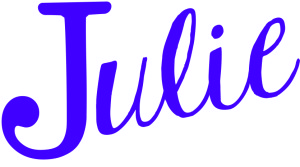Several years back all the K-6 and special education teachers in our districts participated in the Language Essentials for Teachers of Language and Spelling (LETRS) training. One of the beginning sessions introduced the the five key areas of reading instruction proposed by the National Reading Panel. Phonemic awareness and phonics are two of these components. During this session, there seemed to be quite a bit of confusion over the terms of “phonological awareness”, “phonemic awareness” and “phonics” and knowing the difference between those terms. So, let me see if I can help provide clarification.
Phonological Awareness- Phonological awareness is a general appreciation of how spoken language can be divided into its components. For example, we speak in sentences. Sentences can be broken down into words and words into syllables. Breaking words into onset-rime and an appreciation of rhyme and alliteration fall under the category of phonological awareness.
Phonemic Awareness- The word “phoneme” means sound. When a word is broken down into its smallest unit, a sound (or phoneme), the term “phonemic awareness” is used. Phonemic awareness is a sub skill of the broad category of phonological awareness. Phoneme isolation, blending, and segmenting are several skills that fall under this category.
Maybe this graphic helps.
Click the following link to download the above graphic: Phonological Awareness
Phonics and phonemic awareness are not the same. Phonics involves how speech sounds correspond to the written letter or letter combinations. Phonemic awareness is only about hearing and manipulating the individual speech sounds in words. The best way to remember the difference between these two terms is to know that any phonemic awareness skills can be “done in the dark”.
 To download the “Do It In the Dark” poster click the following link: Phonemic Awareness Do It In the Dark
To download the “Do It In the Dark” poster click the following link: Phonemic Awareness Do It In the Dark
Did you know– Research has identified phonemic awareness and letter knowledge as the two best predictors of how well a child will learn to read during the first two years of school.




I love your posters! Thanks so much for these. They are really help get the message across in an interesting way. 🙂
I have a Phonological Awareness Assessment Freebie on my blog that you are welcome to pass on: http://smarttartslearning.blogspot.com/2012/09/phonological-awareness-assessment.html
Thanks so much. I’ll go check it out. Julie
I love all the materials you have in this site. It’s stellar helpful. This can really help my students successful in learning. I am a teacher aide but have my own class of 22 alone and supply is very scarce. Searching online for stuff will take you all day but your website is certainly the answer I am looking for.
Having said that, I do have several items ordered and multiple wish list as well. I have trouble going back to my cart to check out. Now this is not my first time buying teaching materials online it usually easy to back to your cart and check-out. When I tried to purchase one last item from blog.maketaketeach.com it will take you to the link but I couldn’t get in their. Is there something I am missing here…please help…please I needed to have those materials to be able to teach successfully. Hope to hear from you soon.
Rosalie Campbell
Hi Rosalie- all the printables on this blog is are linked to Teachers Pay Teachers. Is it there that you are having trouble? If so, click on the “contact us”- that’s their technical support and they can help you. If not, please let me know. You can email me at [email protected]
This is a great post. These skills are so often neglected in the foundation phase. Then people wonder why so many children do bad later!!! Sight words, speed reading, letter names all have a place….NOT in early years though. Only when foundation for writing and reading is firmly laid.
The research and evidence is there.
Totally agree. Thanks for leaving a comment.
If you haven’t seen the Bright Solutions for Dyslexia web page, there is a wealth of information there that is very easy to understand and helpful. As a parent, I feel that all teachers would benefit from absorbing the knowledge assembled there. http://www.dys-add.com
I am interested in activities to help children learn the fun way.
Thank You